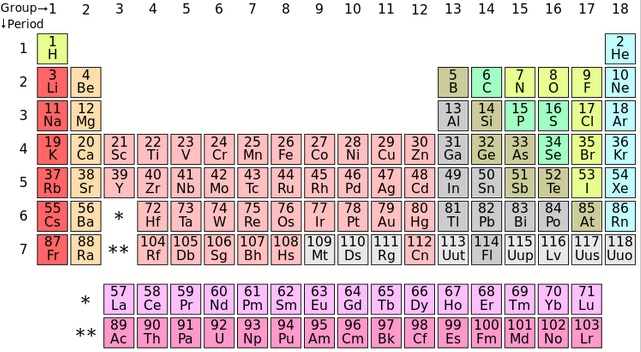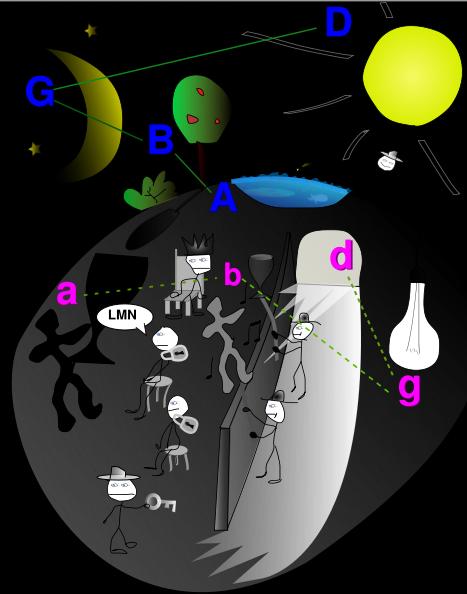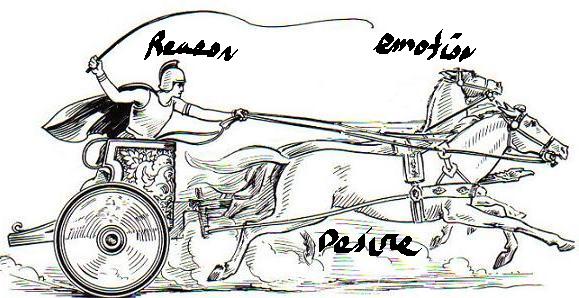|
Life
Plato went to Sicily after Socrates died.
Southern Italy was a part of Greece at the time.
In Sicily, he wrote most of the early dialogues, and
the first half of the Republic.
He came back to Athens, and formed the Academy.
It was in a grove (academia).
He taught there until his death (age eighty).
His most noticeable student was Aristotle.
Aristotle stayed with him until Plato's death.
Aristotle formed the Lyceum.
Aristotle was a Macedonian.
He left Athens when the Macedonians started fighting
again.
His student was Alexander of Mascedon.
Plato wrote in the dialogue form.
He uses obviously fallacious; they sound valid, but
are invalid.
Socrates was consumed with social problems, moral
problems, and political problems.
Plato was a metaphysician and epistemologist.
Plato doesn't take credit for his ideas.
The
Republic
Plato (427-347 B.C.)
Metaphysical/Epistemological Abstract
1. Perceptions are unfit objects for
knowledge.
The following are true of perception:
a.
Sense knowledge is relative.
b.
Each man is
the measure of all things (Protagoras).
c. All things change
(Heraclitus).
d. They cannot be grasped by essential definitions.
2. Forms are proper objects of knowledge.
a. This knowledge is
absolute and infallible.
b. Forms are eternal and
unchanging (Parmenidies).
c. They exist apart from
sensible things and God (Timaeus).
d. They are not in a place
or time.
e. They are capable of
essential definitions (Socrates).
3. The Good is the object of wisdom.
a.
God and the soul are Parmenidean (#380d,
381a)
THE DIVIDED LINE
|
The Good
|
WISDOM
unchanging, eternal |
Higher Forms
Lower Forms |
KNOWLEDGE
Intelligible Realm -
Rationalism
objective,
unchanging, eternal |
|
|
 |
Physical Objects
|
|
BELIEF |
|
Shadows & Reflections |
|
OPINION
Sensible
Realm -
Empiricism
particulars, spatiotemporal,
changing, temporary |
From the least
real and least knowable
to the most
real and most knowable. |
|
Forms require images to understand them. Examples of
forms are found in geometry. They require
our familiarity with particular circles, squares,
and lines. Essential definitions are also in other
fields; for example:
Dmitri Mendeleev's Periodic Table:

The higher forms don't require any images for us to
understand them. These are found in the realm of
pure mathematics. We cannot draw a picture of an
algebraic equation or a differential equation? All
the things philosophers concern themselves with
would belong to this realm:
Love is the idea of the beauty of the beloved - John
Carbonara
Justice is giving one's due - Plato's Republic
Knowledge is justified true belief - Plato's
Theaetetus
Man is the
the Rational Animal - Aristotle
In
Aristotle's above definition "Rational Animal" is
the definiens. The term Man is the definiendum. The
thing you are defining (the definiendum) goes first,
then the is of identity, next the property that
separates that thing from other things, and last the
kingdom (Animal) goes last.
When
the being of one depends on something else, it is
less real.
Reflections depend on the reflected object.
Material objects depend upon the forms they reflect.
A
chair cannot be manufactured without a blueprint.
A
photographer makes a brochure of the chair.
As we go up the ling, things become more real - and
knowable.
In every field, we study general things - not
particulars.
The senses lead to solipsism (You can only know your
subjective state).
Reason tells you that solipsism is wrong. Things
exists when we are not looking at them.
THE CAVE ANALOGY

The Republic
Plato (427-347 B.C.)
1. Politics is directed towards citizens.
2. The soul contains reason, emotion, and
desire. See Note:
Reason
is the highest, and should balance emotions and
desires.

3. Virtue in the individual occurs when all three
are balanced (#442a).
Justice in the state occurs when all three
are balanced (#442a).
The end of virtue is happiness
(#353).
4. A state contains rulers, soldiers, and
workers.
Plato's Republic is totalitarian;
everyone should not have a say.
The worst form of government is a
democracy.
5. Citizens should be educated, selected,
and bred.
Rulers are to be educated as
philosophers.
It's a government of merit
(meritocracy).
6. Personal property is abolished
(Communism).

Something to consider
Collaborate:
Virtue is a balanced temperament.
Reason decides what emotions and desires to allow.
Keep in mind that the color black is made by mixing
red, yellow, and blue in equal amounts. Purple is
made by mixing red and blue. Green is the mixture of
blue and yellow, and orange is the mixture of yellow
and red.
1. Identify the picture that represents a virtuous
person.
2. Describe the vices.
3. Are there possible vices that are missing?
The Phaedo
Plato (427-347 B.C.)
The dialogue was named after the narrator. Phaedo recounts the events, and the
conversation, that took place between Socrates and
his companions on the final day of his life. Other characters are Simmias and Cebes.
Abstract:
1. Forms are eternal and unchanging.
A form is the true nature of a thing.
A beautiful object is beautiful to the degree
that
it participates in absolute beauty.
An act is just
to the degree that it participates in absolute
justice.
2. The soul is
formless, eternal, and unchanging (Parmenidean)
The body is a composite thing.
The soul is a simple nonthing.
Since the soul is the opposite of the
body,
there is no reason to think
it will
share the same fate.
The soul is what brings life to the
body.
3. Knowledge
is justified true belief.
Knowledge is recollection.
Ideas like eternity, equality, perfection, and God
could not
have occurred to us in this lifetime, so
we must have
acquired them before we were born.
4. Physical things copy the forms. They're
constantly changing.
5. The forms are the proper objects of
knowledge.
The forms cannot be known by the senses, but by
intuition.
6. The body is the cause of ignorance.
The forms are known by the mind alone.
The body hinders the soul's search for knowledge.
Philosophers pursue a kind of death.
True wisdom occurs after death.
7.
The Soul/Good/God are the proper objects of Wisdom.
Mind is the cause of all things
(Anaxagoras).
8. Be on guard for misology and misanthropy.
Misology is the hatred of logic.
Misanthropy is the hatred of people.
...but first there is a certain
experience we must be careful to avoid...That we
must not become misologues, as people become
misanthropes. There is no greater evil one can
suffer than to hate reasonable discourse. Misology
and misanthropy arise in the same way. Misanthropy
comes when a man without knowledge or skill has
placed great trust in someone and believes him to be
altogether truthful, sound and trustworthy; then, a
short time afterwards he finds him to be wicked and
unreliable, and then this happens in another case;
when one has frequently had that experience,
especially with those whom one believed to be one's
closest friends, then, in the end, after many blows,
one comes to hate all men and to believe that no one
is sound in any way at all...This is a shameful
state of affairs...and obviously due to an attempt
to have human relations without any skill in human
affairs.
— Plato, Phaedo, 89d–e |